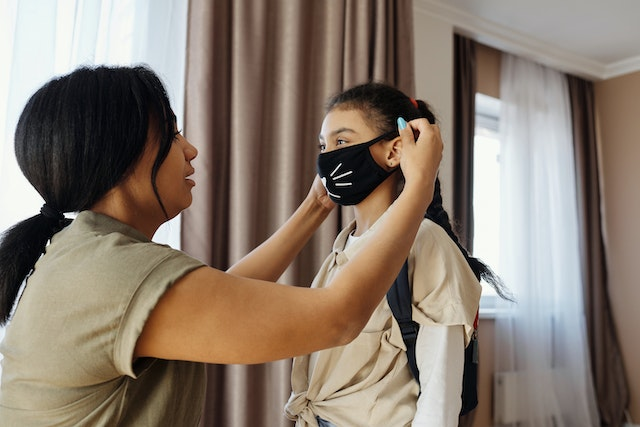
Is Omicron dangerous? What are the precautions I should take?
Time to read 6 min
Time to read 6 min
With multiple mutations present within the variant, it is important to understand the risk factors involved. The rising number of COVID 19 cases are attributed to the rise of the Omicron variant, which is causing significant distress among communities.
It is important to understand how dangerous Omicron can be for you and your family, while knowing the risks involved with exposure and management. While the symptoms may be different for Omicron than COVID, the risk is prevalent nonetheless.
You should be careful of your exposure to the virus, while also being vigilant about following the right protocols. Doctors focusing on the question of "is Omicron dangerous?", analyse the risk factors involved for individuals that may be at high-risk.
Additionally, its alarming rise in South Africa is a cause for concern for global epidemiologists. At the cutting-edge of SARS COV 2 analyses, doctors are understanding the impact of the delta variant and Omicron.
Virologists at the university of various institutes are studying the role of the virus in immunosuppression and overall impact on quality of life. For the individuals that have Omicron, they need to follow special instructions to manage the virus.
In the event that you are to be tested for Omicron, you need to know what it is. Some people may be confused that the Omicron variant is the same as COVID or delta, which is why it's important to know the key difference.
Omicron is a modern variant of the SARS COV 2 virus, and is now a predominant variant worldwide. Omicron is known to be more transmissible than prior variants and has the capability to re-infect individuals at a higher rate.
It's also important to note that even if you are vaccinated and boosted for COVID 19, you are still at risk for Omicron. If you are at a higher risk of exposure, you can still get the virus. It's critical to get tested immediately when you start experiencing symptoms.
There are several reasons why Omicron is emerging as a threat within the global epidemiology sphere. The variant is more potent and easily transmissible while causing a real threat to the global economy.
You are also more likely to get Omicron when compared to other variants, which is why you should get tested regularly when you start experiencing symptoms. If you are going to office or are visiting friends, getting a complete Omicron test done is ideal.
The risk of spreading of the infection is much higher with Omicron when compared to other strains. The mutation of Omicron makes it a more potent form of the SARS COV 2 virus. You can also spread it unknowingly even when you are asymptomatic.
The other issue with Omicron's viral load is that it rises over time. You can have your viral load increase during the early stages of the incubation. This means that you can accidently spread the omicron variant without knowing.
The impact on the patient's health markers is significantly greater in the case of Omicron when compared to other mutations. The variant can cause long-term complications and deaths in patients with pre-existing conditions as well.
The rising number of hospitalizations and complications emerging because of Omicron are making it a serious virus to deal with for many countries. If you suspect that you are experiencing the chief symptoms then getting tested is the best option.
With India experiencing several waves of COVID, we are now in a more relaxed state. The global economy and countries managing COVID cases are also not enforcing mask mandates. This has been one of the main reasons why the risk of spreading is rising.
Booster shots may also take some time for the greater public, depending on the number of cases rising. That's why it is important to get an Omicron test done near you immediately. You can also get tested and get your results quickly.
You can focus on the following precautions when dealing with Omicron.
Getting a test for Omicron is one of the best preventative measures that you can opt for. This will ensure that you are protected from the virus long-term, and can focus on minimizing the impact on your daily activities.
High-risk areas, such as malls, crowds, functions, and events, should be avoided at all costs. These zones may be ripe for the spreading of Omicron, making it more challenging to deal with the virus.
Tracking your symptoms regularly is one of the best ways to ensure that you are protected. If you find that you have an extended fever or are experiencing chills and sweating, then you should get an Omicron test done immediately.
The most important aspect of managing the virus is to wear a mask. There are several advantages of continuing to wear as mask such as,
1. Lower risk of getting the virus.
2. Decreased chance of transmission in case you may have it.
3. Lower possibility of viral load development.
4. Protection from high-risk zones.
5. Lower chance of touching mouth/skin.
6. Better example setting for kids.
The best way to protect yourself and others is to quarantine when experiencing the key symptoms. This can help you prevent the spread of the virus and get the right treatment in a controlled environment.
When the booster shot is made available for you, it is important to get it in time. This will lower your risk of exposure significantly and protect you long-term.
These precautions make it safer for individuals to traverse through different spaces and avoid exposure
There are key symptoms you should watch out for when dealing with Omicron. As the symptoms can evolve over time, it is best to be mindful of all of them. You can track their emergence and spreading through the right measures.
Key symptoms can include runny nose, sore throat, difficulty breathing, wheezing, chills, fever, and muscle pain. These symptoms can also escalate over time, making it harder to identify them individually.
There are several high risk areas that you should be aware of when you are taking preventative measures against Omicron. These high-risk zones can emerge at anytime, which is why you should be mindful when entering these spaces.
1. Large gatherings, including crowded areas.
2. Functions and events.
3. Crowded places of worship.
4. Tightly packed restaurants.
5. Hospitals already dealing with Omicron.
6. High footfall malls and shopping centres.
7. Areas with no-mask mandates.
8. Parties at homes where infection can spread.
Yes, there is still a significant risk present when you are just following your daily routine. Going to office, going to a mall, or buying groceries can still lead to infections emerging in high-risk areas.
Even if you are not a healthcare worker or are not attending parties regularly, you can still be at risk. If you are ride-sharing or are in a car for extended periods with someone with Omicron, you can still get it.
You can get the best Omicron test in India through MyDiagnostics. You can buy an Omicron test in your city through our platform. The Omicron test price is also optimized for multiple testing, including home delivery of the testing kit.
You can also get the test results generated in a faster timespan. This helps you protect yourself and your family members better, while reducing the risk of transmission to others by not knowing.
* Medical Disclaimer - The following information is for educational purposes only. No information provided on this website, including text, graphic, and images, are intended as substitutes for professional medical advice. Please consult with your doctor about specific medical advice pertaining to your condition(s).



